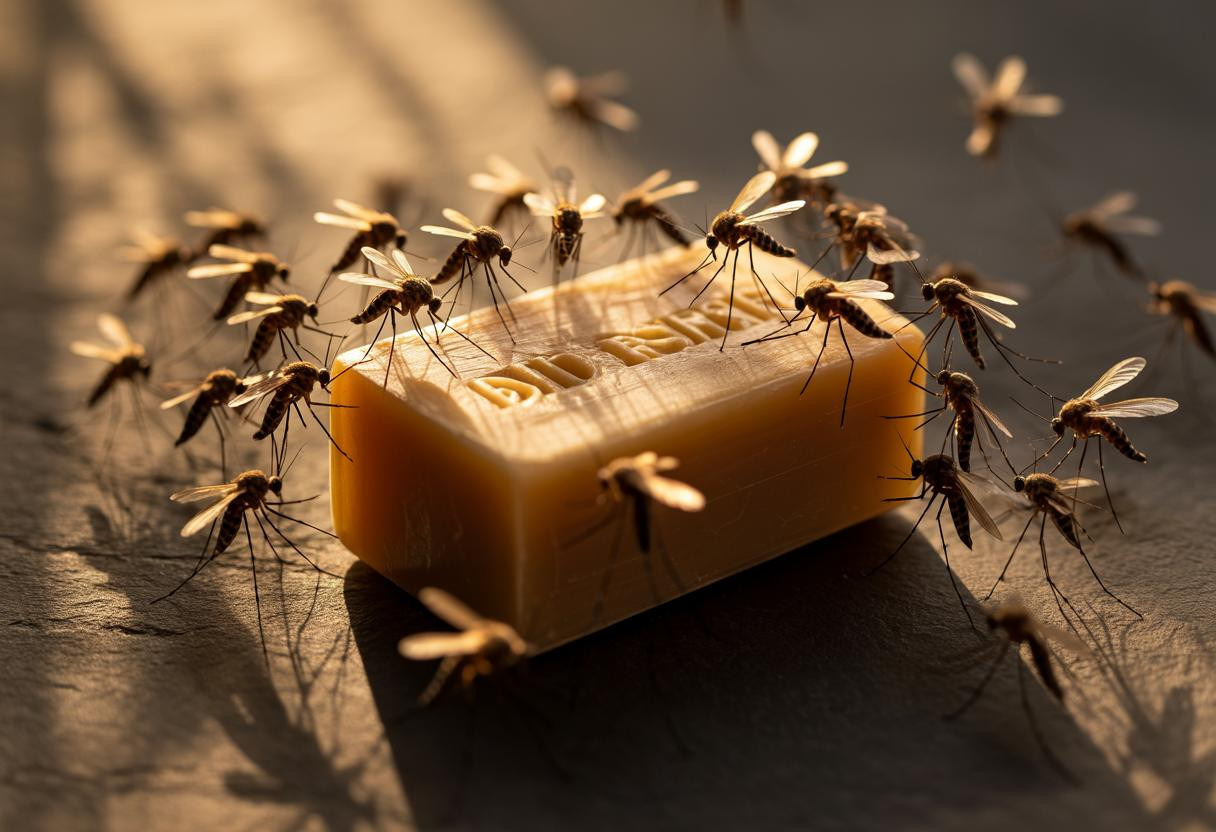The idea that a simple bar of soap could determine your fate with mosquitoes sounds almost too convenient to be true. Yet emerging research reveals that your choice of soap directly influences mosquito attraction by fundamentally altering your body’s chemical signature—and the results might surprise you more than you’d expect.
This isn’t folklore or marketing hype. Scientists have discovered that soaps don’t just clean your skin; they create entirely new odor profiles that mosquitoes either find irresistible or completely repulsive.
The chemistry behind soap-based mosquito control
Recent studies published in iScience demonstrate that washing with certain soaps can increase mosquito attraction by up to 30%, while others create a natural barrier. The mechanism involves volatile compounds like limonene and essential oils that mask human attractants such as lactic acid and carbon dioxide traces on skin.
Researchers tested four popular soap brands—Dial, Dove, Native, and Simple Truth—and found dramatically different results. Native soap consistently showed repellent effects, while floral-scented varieties actually enhanced attraction. The key lies in how these chemical compounds interact with your unique skin microbiome.
What makes this discovery particularly fascinating is its connection to natural plant-based solutions for personal health, demonstrating how simple botanical ingredients can create powerful protective effects through everyday products.
Molecular interactions that matter
The science centers on terpenoid compounds found in certain soaps. Limonene, derived from citrus oils, disrupts mosquito olfactory receptors by creating competing scent signals. Meanwhile, synthetic soaps high in fatty acid esters can actually amplify the very chemical signatures that draw mosquitoes to human hosts.
Pyrethroid analogs, when combined with natural essential oils, have shown 100 times greater effectiveness than standard repellents in laboratory settings, suggesting that hybrid formulations represent the future of soap-based protection.
Real-world applications that actually work
The most promising developments come from unexpected places. In East Africa, researchers developed Faso Soap using locally sourced neem and citronella, providing up to 6 hours of mosquito protection while serving as a regular bathing soap.
This approach mirrors behavioral science insights that transform daily habits by integrating protection into existing routines rather than requiring additional steps.
The counterintuitive finding
Here’s what surprised researchers most: expensive, heavily fragranced soaps often performed worse than basic formulations. Floral scents, particularly those containing linalool, can increase mosquito attraction by mimicking flower nectar signatures that these insects naturally seek.
Choosing the right soap for protection
Based on current research, prioritize soaps containing neem, citronella, or lemongrass oils for multi-hour protection. Avoid heavily perfumed varieties, especially those with sweet or floral scents that can backfire by enhancing your attractiveness to mosquitoes.
Application strategies
Reapply every 4-6 hours for optimal effectiveness, as volatile compounds dissipate quickly from skin surfaces. Consider combining soap-based protection with traditional methods—this layered approach provides the most comprehensive defense.
The sustainability aspect aligns with sustainable bioeconomy approaches gaining recognition, as plant-based repellent soaps reduce reliance on synthetic pesticides while supporting local agricultural economies.
Important limitations
Individual skin chemistry creates significant variability in results. What repels mosquitoes for one person may attract them to another, making personal testing essential. Additionally, soap-based protection works best as supplementary defense rather than standalone protection in high-risk areas.
The future of soap-based mosquito control
Emerging research focuses on sustained-release formulations that extend protection duration and hybrid compounds that combine natural oils with targeted synthetic enhancers. Machine learning models are now predicting optimal soap compositions based on regional mosquito species and local environmental factors.
This simple household switch represents something larger: the power of integrating scientific discovery into everyday routines. While soap alone won’t eliminate mosquito problems, it offers an accessible, culturally adaptive tool that transforms a daily necessity into active protection—proving that sometimes the most effective solutions hide in plain sight.
